Trends in Hospitality: Globalization and Sustainability Report
VerifiedAdded on 2022/09/12
|7
|1672
|18
Report
AI Summary
This report examines two significant contemporary trends influencing the hospitality industry: globalization and sustainability. The introduction highlights the industry's economic importance and the need to adapt to current changes, focusing on the hotel sector. The report delves into sustainability in hotels, discussing the shift towards eco-friendly practices, energy conservation, waste reduction, and the integration of natural elements, with a focus on how sustainability impacts hotel operations, development and customer attraction. It also explores globalization's impact, including economic integration, cultural exchange, tourism growth, and the development of new markets for hotels, specifically focusing on how globalization creates opportunities for hotels to expand and cater to diverse customer bases. The conclusion summarizes the implications of these trends, addressing challenges such as loss of authenticity, strategic issues, and workforce management, emphasizing the need for hospitality businesses to adapt to these evolving trends.
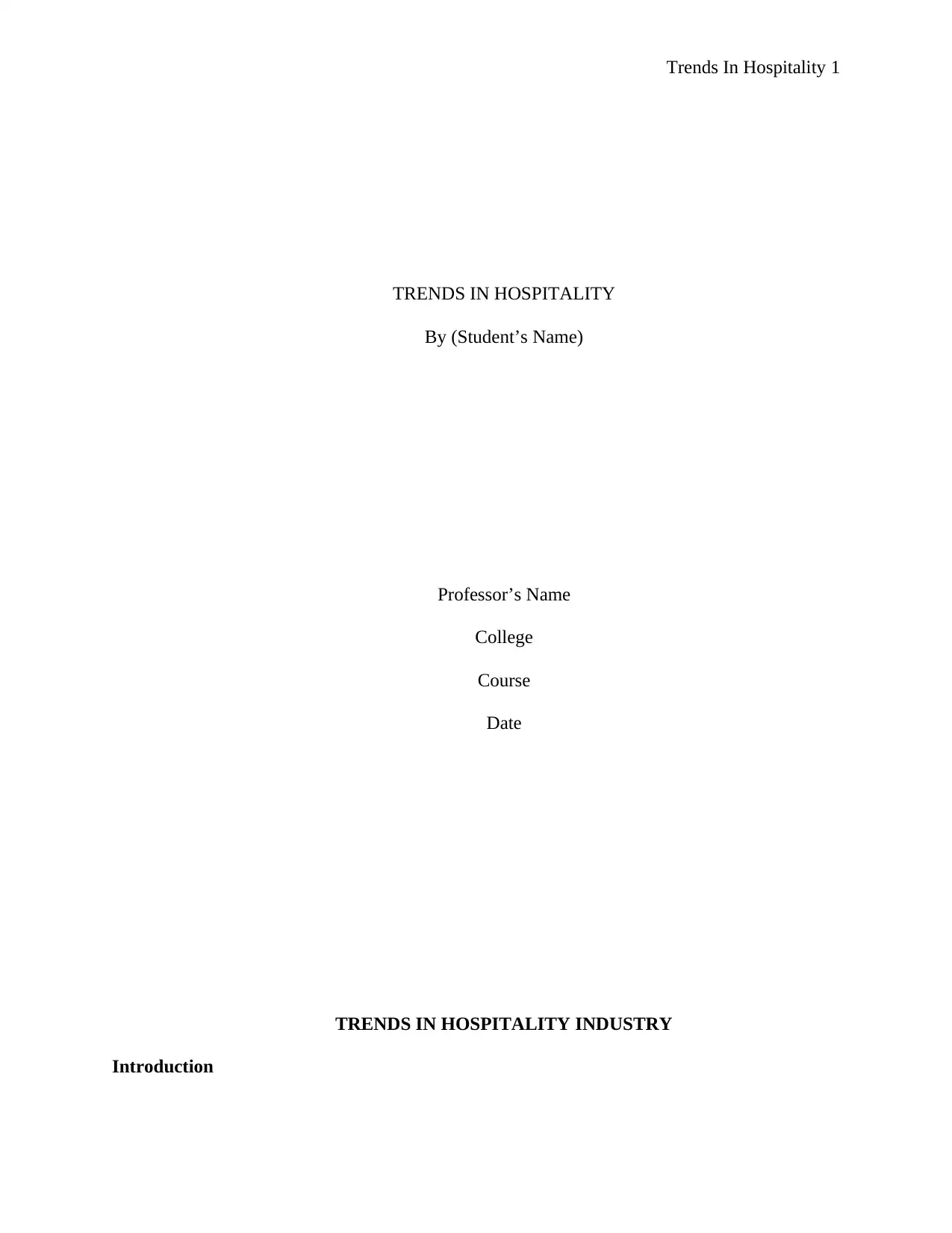
Trends In Hospitality 1
TRENDS IN HOSPITALITY
By (Student’s Name)
Professor’s Name
College
Course
Date
TRENDS IN HOSPITALITY INDUSTRY
Introduction
TRENDS IN HOSPITALITY
By (Student’s Name)
Professor’s Name
College
Course
Date
TRENDS IN HOSPITALITY INDUSTRY
Introduction
Paraphrase This Document
Need a fresh take? Get an instant paraphrase of this document with our AI Paraphraser
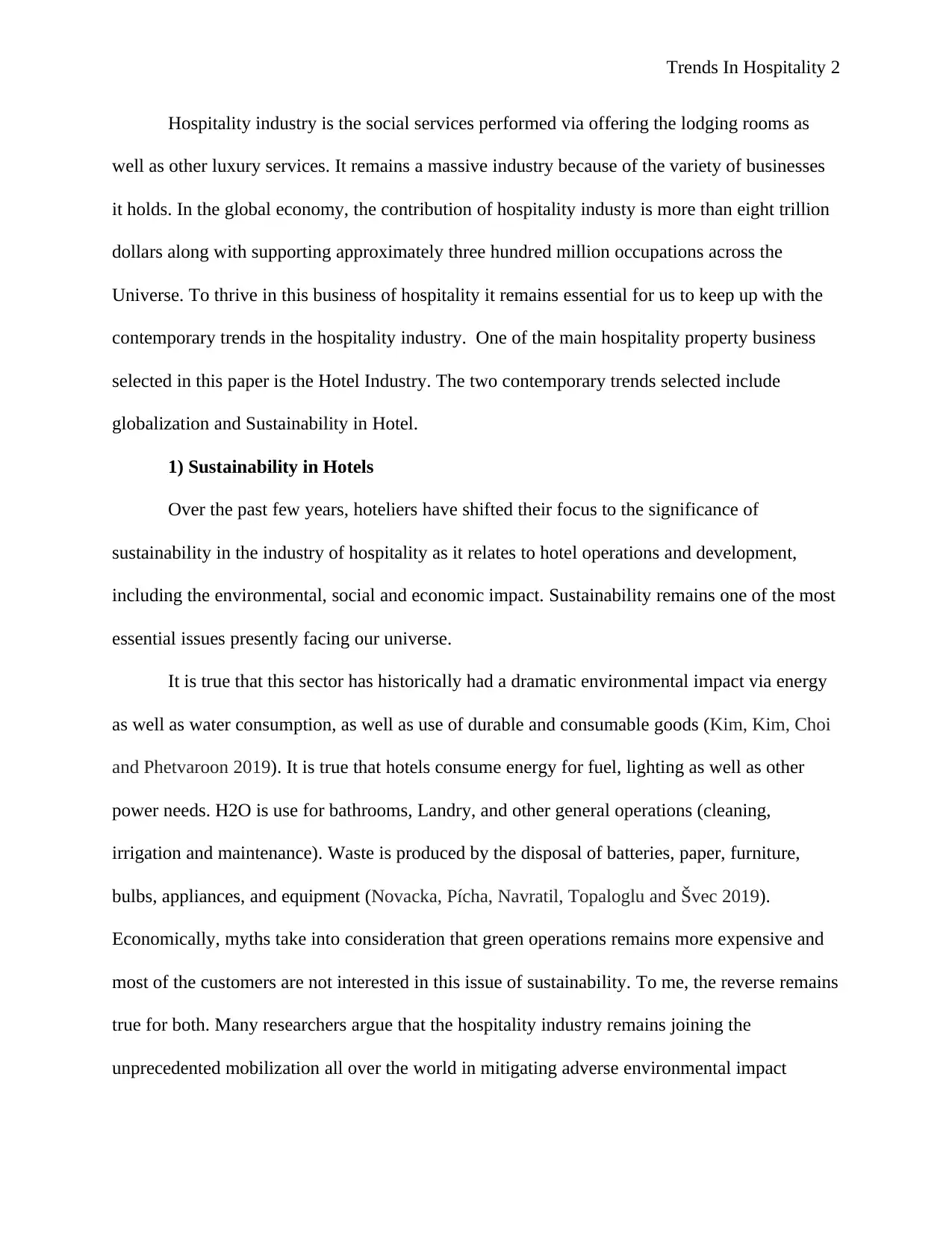
Trends In Hospitality 2
Hospitality industry is the social services performed via offering the lodging rooms as
well as other luxury services. It remains a massive industry because of the variety of businesses
it holds. In the global economy, the contribution of hospitality industy is more than eight trillion
dollars along with supporting approximately three hundred million occupations across the
Universe. To thrive in this business of hospitality it remains essential for us to keep up with the
contemporary trends in the hospitality industry. One of the main hospitality property business
selected in this paper is the Hotel Industry. The two contemporary trends selected include
globalization and Sustainability in Hotel.
1) Sustainability in Hotels
Over the past few years, hoteliers have shifted their focus to the significance of
sustainability in the industry of hospitality as it relates to hotel operations and development,
including the environmental, social and economic impact. Sustainability remains one of the most
essential issues presently facing our universe.
It is true that this sector has historically had a dramatic environmental impact via energy
as well as water consumption, as well as use of durable and consumable goods (Kim, Kim, Choi
and Phetvaroon 2019). It is true that hotels consume energy for fuel, lighting as well as other
power needs. H2O is use for bathrooms, Landry, and other general operations (cleaning,
irrigation and maintenance). Waste is produced by the disposal of batteries, paper, furniture,
bulbs, appliances, and equipment (Novacka, Pícha, Navratil, Topaloglu and Švec 2019).
Economically, myths take into consideration that green operations remains more expensive and
most of the customers are not interested in this issue of sustainability. To me, the reverse remains
true for both. Many researchers argue that the hospitality industry remains joining the
unprecedented mobilization all over the world in mitigating adverse environmental impact
Hospitality industry is the social services performed via offering the lodging rooms as
well as other luxury services. It remains a massive industry because of the variety of businesses
it holds. In the global economy, the contribution of hospitality industy is more than eight trillion
dollars along with supporting approximately three hundred million occupations across the
Universe. To thrive in this business of hospitality it remains essential for us to keep up with the
contemporary trends in the hospitality industry. One of the main hospitality property business
selected in this paper is the Hotel Industry. The two contemporary trends selected include
globalization and Sustainability in Hotel.
1) Sustainability in Hotels
Over the past few years, hoteliers have shifted their focus to the significance of
sustainability in the industry of hospitality as it relates to hotel operations and development,
including the environmental, social and economic impact. Sustainability remains one of the most
essential issues presently facing our universe.
It is true that this sector has historically had a dramatic environmental impact via energy
as well as water consumption, as well as use of durable and consumable goods (Kim, Kim, Choi
and Phetvaroon 2019). It is true that hotels consume energy for fuel, lighting as well as other
power needs. H2O is use for bathrooms, Landry, and other general operations (cleaning,
irrigation and maintenance). Waste is produced by the disposal of batteries, paper, furniture,
bulbs, appliances, and equipment (Novacka, Pícha, Navratil, Topaloglu and Švec 2019).
Economically, myths take into consideration that green operations remains more expensive and
most of the customers are not interested in this issue of sustainability. To me, the reverse remains
true for both. Many researchers argue that the hospitality industry remains joining the
unprecedented mobilization all over the world in mitigating adverse environmental impact
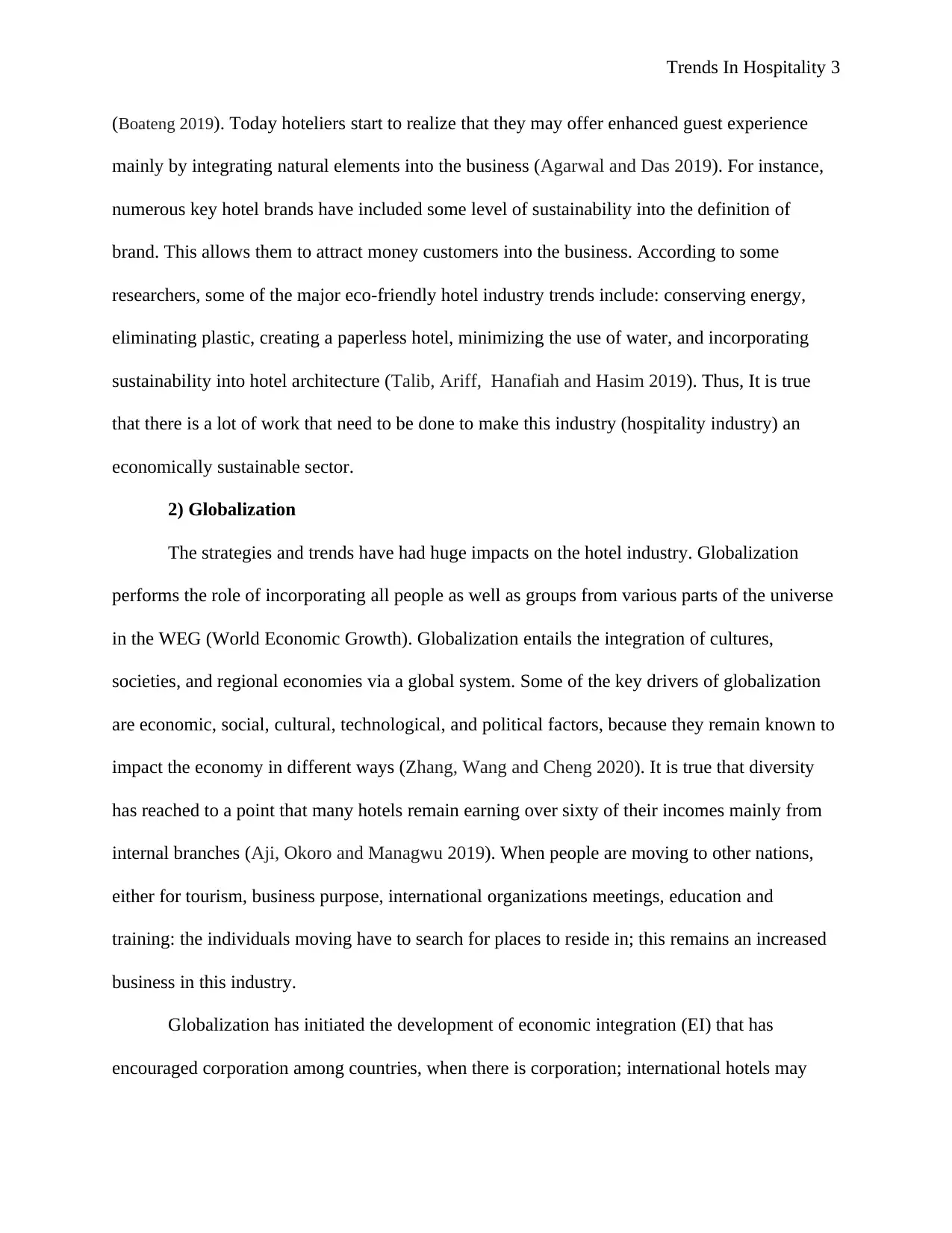
Trends In Hospitality 3
(Boateng 2019). Today hoteliers start to realize that they may offer enhanced guest experience
mainly by integrating natural elements into the business (Agarwal and Das 2019). For instance,
numerous key hotel brands have included some level of sustainability into the definition of
brand. This allows them to attract money customers into the business. According to some
researchers, some of the major eco-friendly hotel industry trends include: conserving energy,
eliminating plastic, creating a paperless hotel, minimizing the use of water, and incorporating
sustainability into hotel architecture (Talib, Ariff, Hanafiah and Hasim 2019). Thus, It is true
that there is a lot of work that need to be done to make this industry (hospitality industry) an
economically sustainable sector.
2) Globalization
The strategies and trends have had huge impacts on the hotel industry. Globalization
performs the role of incorporating all people as well as groups from various parts of the universe
in the WEG (World Economic Growth). Globalization entails the integration of cultures,
societies, and regional economies via a global system. Some of the key drivers of globalization
are economic, social, cultural, technological, and political factors, because they remain known to
impact the economy in different ways (Zhang, Wang and Cheng 2020). It is true that diversity
has reached to a point that many hotels remain earning over sixty of their incomes mainly from
internal branches (Aji, Okoro and Managwu 2019). When people are moving to other nations,
either for tourism, business purpose, international organizations meetings, education and
training: the individuals moving have to search for places to reside in; this remains an increased
business in this industry.
Globalization has initiated the development of economic integration (EI) that has
encouraged corporation among countries, when there is corporation; international hotels may
(Boateng 2019). Today hoteliers start to realize that they may offer enhanced guest experience
mainly by integrating natural elements into the business (Agarwal and Das 2019). For instance,
numerous key hotel brands have included some level of sustainability into the definition of
brand. This allows them to attract money customers into the business. According to some
researchers, some of the major eco-friendly hotel industry trends include: conserving energy,
eliminating plastic, creating a paperless hotel, minimizing the use of water, and incorporating
sustainability into hotel architecture (Talib, Ariff, Hanafiah and Hasim 2019). Thus, It is true
that there is a lot of work that need to be done to make this industry (hospitality industry) an
economically sustainable sector.
2) Globalization
The strategies and trends have had huge impacts on the hotel industry. Globalization
performs the role of incorporating all people as well as groups from various parts of the universe
in the WEG (World Economic Growth). Globalization entails the integration of cultures,
societies, and regional economies via a global system. Some of the key drivers of globalization
are economic, social, cultural, technological, and political factors, because they remain known to
impact the economy in different ways (Zhang, Wang and Cheng 2020). It is true that diversity
has reached to a point that many hotels remain earning over sixty of their incomes mainly from
internal branches (Aji, Okoro and Managwu 2019). When people are moving to other nations,
either for tourism, business purpose, international organizations meetings, education and
training: the individuals moving have to search for places to reside in; this remains an increased
business in this industry.
Globalization has initiated the development of economic integration (EI) that has
encouraged corporation among countries, when there is corporation; international hotels may
⊘ This is a preview!⊘
Do you want full access?
Subscribe today to unlock all pages.

Trusted by 1+ million students worldwide
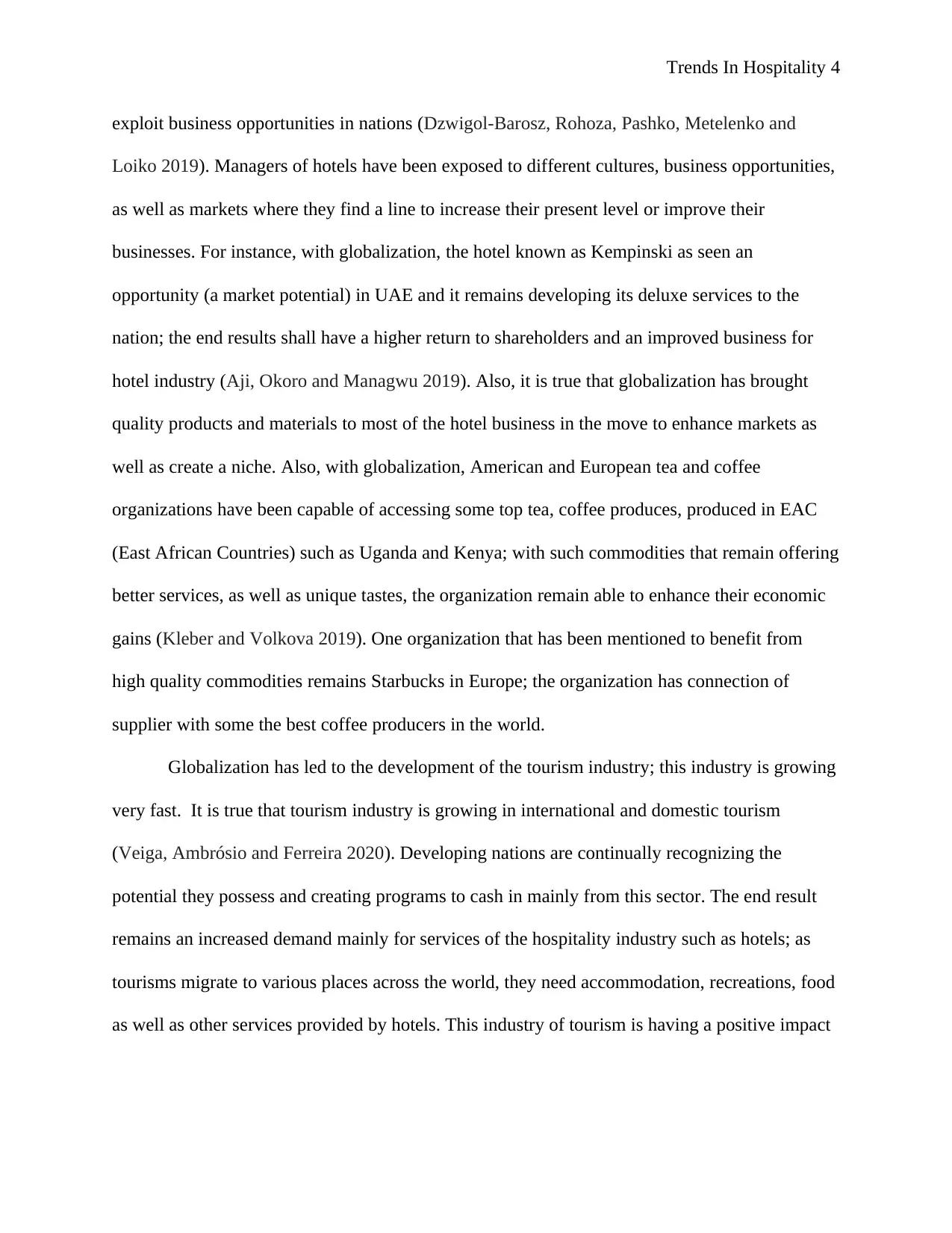
Trends In Hospitality 4
exploit business opportunities in nations (Dzwigol-Barosz, Rohoza, Pashko, Metelenko and
Loiko 2019). Managers of hotels have been exposed to different cultures, business opportunities,
as well as markets where they find a line to increase their present level or improve their
businesses. For instance, with globalization, the hotel known as Kempinski as seen an
opportunity (a market potential) in UAE and it remains developing its deluxe services to the
nation; the end results shall have a higher return to shareholders and an improved business for
hotel industry (Aji, Okoro and Managwu 2019). Also, it is true that globalization has brought
quality products and materials to most of the hotel business in the move to enhance markets as
well as create a niche. Also, with globalization, American and European tea and coffee
organizations have been capable of accessing some top tea, coffee produces, produced in EAC
(East African Countries) such as Uganda and Kenya; with such commodities that remain offering
better services, as well as unique tastes, the organization remain able to enhance their economic
gains (Kleber and Volkova 2019). One organization that has been mentioned to benefit from
high quality commodities remains Starbucks in Europe; the organization has connection of
supplier with some the best coffee producers in the world.
Globalization has led to the development of the tourism industry; this industry is growing
very fast. It is true that tourism industry is growing in international and domestic tourism
(Veiga, Ambrósio and Ferreira 2020). Developing nations are continually recognizing the
potential they possess and creating programs to cash in mainly from this sector. The end result
remains an increased demand mainly for services of the hospitality industry such as hotels; as
tourisms migrate to various places across the world, they need accommodation, recreations, food
as well as other services provided by hotels. This industry of tourism is having a positive impact
exploit business opportunities in nations (Dzwigol-Barosz, Rohoza, Pashko, Metelenko and
Loiko 2019). Managers of hotels have been exposed to different cultures, business opportunities,
as well as markets where they find a line to increase their present level or improve their
businesses. For instance, with globalization, the hotel known as Kempinski as seen an
opportunity (a market potential) in UAE and it remains developing its deluxe services to the
nation; the end results shall have a higher return to shareholders and an improved business for
hotel industry (Aji, Okoro and Managwu 2019). Also, it is true that globalization has brought
quality products and materials to most of the hotel business in the move to enhance markets as
well as create a niche. Also, with globalization, American and European tea and coffee
organizations have been capable of accessing some top tea, coffee produces, produced in EAC
(East African Countries) such as Uganda and Kenya; with such commodities that remain offering
better services, as well as unique tastes, the organization remain able to enhance their economic
gains (Kleber and Volkova 2019). One organization that has been mentioned to benefit from
high quality commodities remains Starbucks in Europe; the organization has connection of
supplier with some the best coffee producers in the world.
Globalization has led to the development of the tourism industry; this industry is growing
very fast. It is true that tourism industry is growing in international and domestic tourism
(Veiga, Ambrósio and Ferreira 2020). Developing nations are continually recognizing the
potential they possess and creating programs to cash in mainly from this sector. The end result
remains an increased demand mainly for services of the hospitality industry such as hotels; as
tourisms migrate to various places across the world, they need accommodation, recreations, food
as well as other services provided by hotels. This industry of tourism is having a positive impact
Paraphrase This Document
Need a fresh take? Get an instant paraphrase of this document with our AI Paraphraser
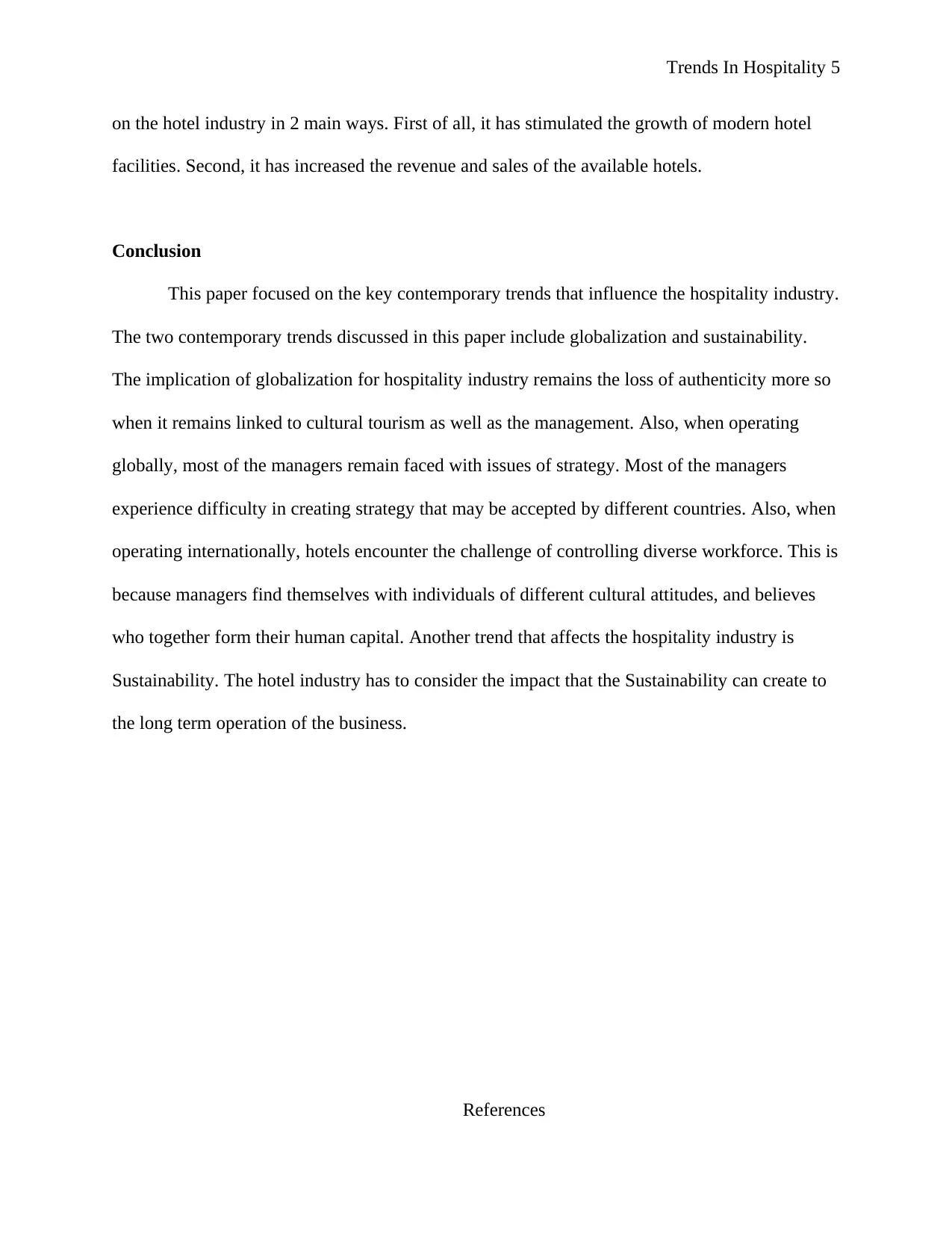
Trends In Hospitality 5
on the hotel industry in 2 main ways. First of all, it has stimulated the growth of modern hotel
facilities. Second, it has increased the revenue and sales of the available hotels.
Conclusion
This paper focused on the key contemporary trends that influence the hospitality industry.
The two contemporary trends discussed in this paper include globalization and sustainability.
The implication of globalization for hospitality industry remains the loss of authenticity more so
when it remains linked to cultural tourism as well as the management. Also, when operating
globally, most of the managers remain faced with issues of strategy. Most of the managers
experience difficulty in creating strategy that may be accepted by different countries. Also, when
operating internationally, hotels encounter the challenge of controlling diverse workforce. This is
because managers find themselves with individuals of different cultural attitudes, and believes
who together form their human capital. Another trend that affects the hospitality industry is
Sustainability. The hotel industry has to consider the impact that the Sustainability can create to
the long term operation of the business.
References
on the hotel industry in 2 main ways. First of all, it has stimulated the growth of modern hotel
facilities. Second, it has increased the revenue and sales of the available hotels.
Conclusion
This paper focused on the key contemporary trends that influence the hospitality industry.
The two contemporary trends discussed in this paper include globalization and sustainability.
The implication of globalization for hospitality industry remains the loss of authenticity more so
when it remains linked to cultural tourism as well as the management. Also, when operating
globally, most of the managers remain faced with issues of strategy. Most of the managers
experience difficulty in creating strategy that may be accepted by different countries. Also, when
operating internationally, hotels encounter the challenge of controlling diverse workforce. This is
because managers find themselves with individuals of different cultural attitudes, and believes
who together form their human capital. Another trend that affects the hospitality industry is
Sustainability. The hotel industry has to consider the impact that the Sustainability can create to
the long term operation of the business.
References
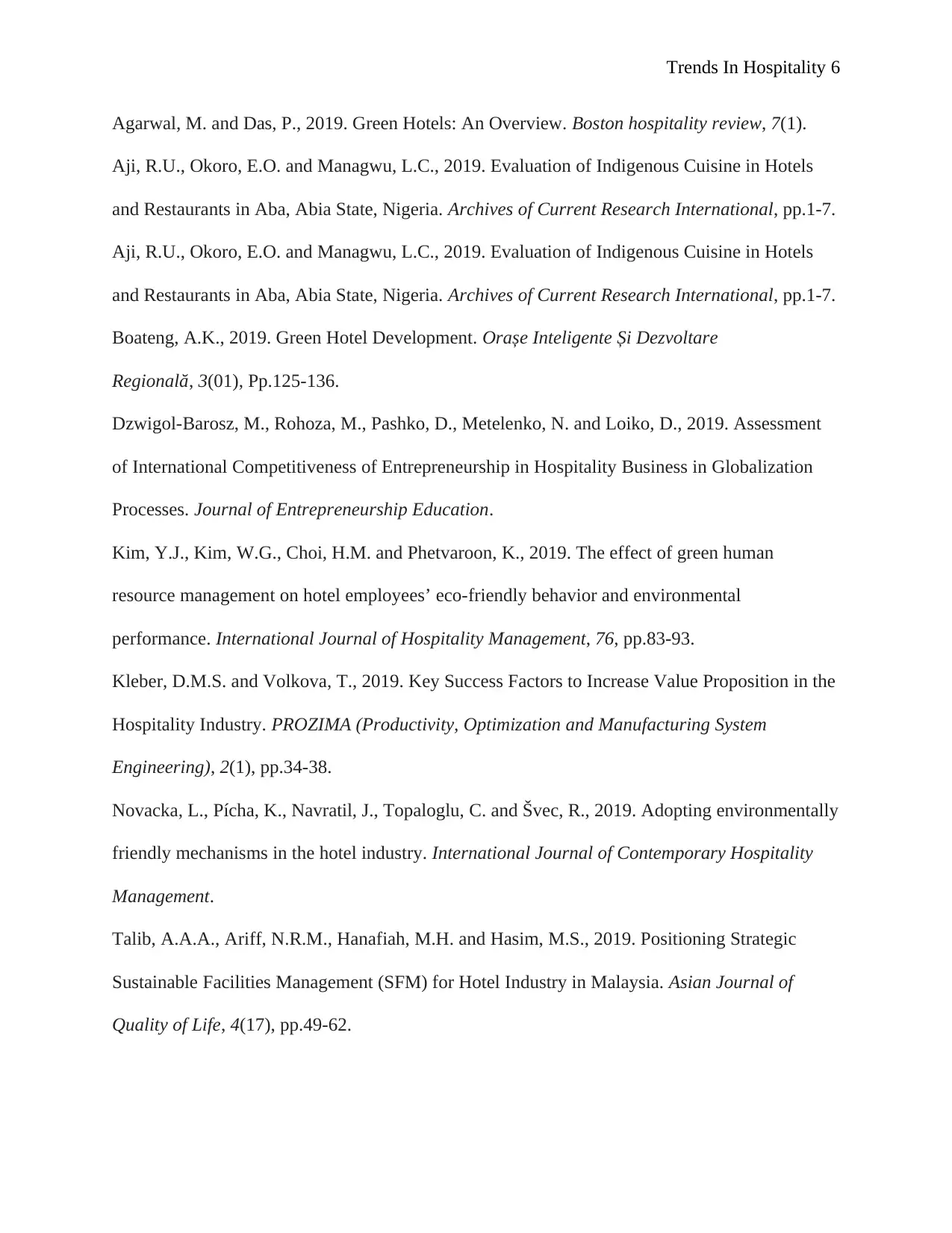
Trends In Hospitality 6
Agarwal, M. and Das, P., 2019. Green Hotels: An Overview. Boston hospitality review, 7(1).
Aji, R.U., Okoro, E.O. and Managwu, L.C., 2019. Evaluation of Indigenous Cuisine in Hotels
and Restaurants in Aba, Abia State, Nigeria. Archives of Current Research International, pp.1-7.
Aji, R.U., Okoro, E.O. and Managwu, L.C., 2019. Evaluation of Indigenous Cuisine in Hotels
and Restaurants in Aba, Abia State, Nigeria. Archives of Current Research International, pp.1-7.
Boateng, A.K., 2019. Green Hotel Development. Orașe Inteligente Și Dezvoltare
Regională, 3(01), Pp.125-136.
Dzwigol-Barosz, M., Rohoza, M., Pashko, D., Metelenko, N. and Loiko, D., 2019. Assessment
of International Competitiveness of Entrepreneurship in Hospitality Business in Globalization
Processes. Journal of Entrepreneurship Education.
Kim, Y.J., Kim, W.G., Choi, H.M. and Phetvaroon, K., 2019. The effect of green human
resource management on hotel employees’ eco-friendly behavior and environmental
performance. International Journal of Hospitality Management, 76, pp.83-93.
Kleber, D.M.S. and Volkova, T., 2019. Key Success Factors to Increase Value Proposition in the
Hospitality Industry. PROZIMA (Productivity, Optimization and Manufacturing System
Engineering), 2(1), pp.34-38.
Novacka, L., Pícha, K., Navratil, J., Topaloglu, C. and Švec, R., 2019. Adopting environmentally
friendly mechanisms in the hotel industry. International Journal of Contemporary Hospitality
Management.
Talib, A.A.A., Ariff, N.R.M., Hanafiah, M.H. and Hasim, M.S., 2019. Positioning Strategic
Sustainable Facilities Management (SFM) for Hotel Industry in Malaysia. Asian Journal of
Quality of Life, 4(17), pp.49-62.
Agarwal, M. and Das, P., 2019. Green Hotels: An Overview. Boston hospitality review, 7(1).
Aji, R.U., Okoro, E.O. and Managwu, L.C., 2019. Evaluation of Indigenous Cuisine in Hotels
and Restaurants in Aba, Abia State, Nigeria. Archives of Current Research International, pp.1-7.
Aji, R.U., Okoro, E.O. and Managwu, L.C., 2019. Evaluation of Indigenous Cuisine in Hotels
and Restaurants in Aba, Abia State, Nigeria. Archives of Current Research International, pp.1-7.
Boateng, A.K., 2019. Green Hotel Development. Orașe Inteligente Și Dezvoltare
Regională, 3(01), Pp.125-136.
Dzwigol-Barosz, M., Rohoza, M., Pashko, D., Metelenko, N. and Loiko, D., 2019. Assessment
of International Competitiveness of Entrepreneurship in Hospitality Business in Globalization
Processes. Journal of Entrepreneurship Education.
Kim, Y.J., Kim, W.G., Choi, H.M. and Phetvaroon, K., 2019. The effect of green human
resource management on hotel employees’ eco-friendly behavior and environmental
performance. International Journal of Hospitality Management, 76, pp.83-93.
Kleber, D.M.S. and Volkova, T., 2019. Key Success Factors to Increase Value Proposition in the
Hospitality Industry. PROZIMA (Productivity, Optimization and Manufacturing System
Engineering), 2(1), pp.34-38.
Novacka, L., Pícha, K., Navratil, J., Topaloglu, C. and Švec, R., 2019. Adopting environmentally
friendly mechanisms in the hotel industry. International Journal of Contemporary Hospitality
Management.
Talib, A.A.A., Ariff, N.R.M., Hanafiah, M.H. and Hasim, M.S., 2019. Positioning Strategic
Sustainable Facilities Management (SFM) for Hotel Industry in Malaysia. Asian Journal of
Quality of Life, 4(17), pp.49-62.
⊘ This is a preview!⊘
Do you want full access?
Subscribe today to unlock all pages.

Trusted by 1+ million students worldwide
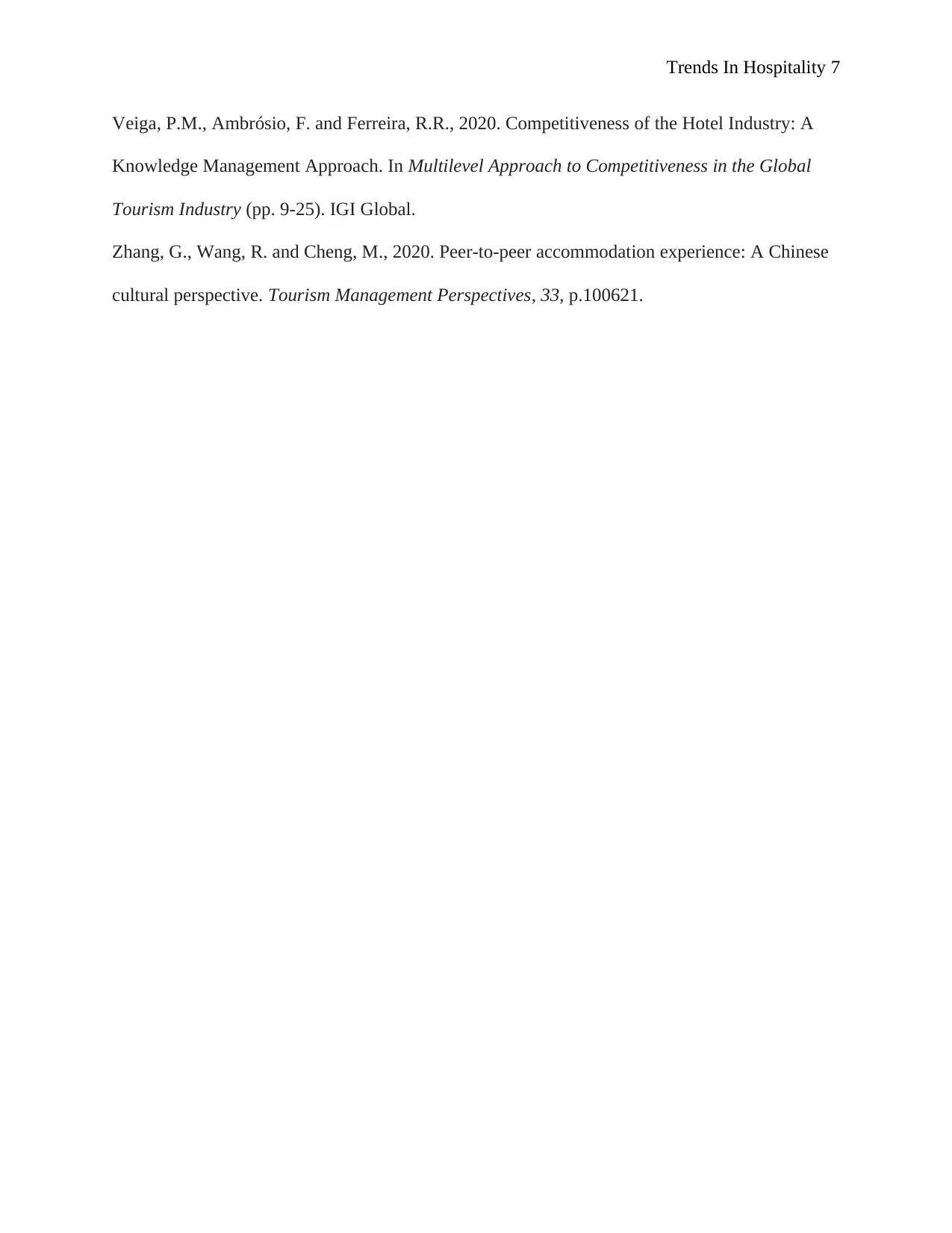
Trends In Hospitality 7
Veiga, P.M., Ambrósio, F. and Ferreira, R.R., 2020. Competitiveness of the Hotel Industry: A
Knowledge Management Approach. In Multilevel Approach to Competitiveness in the Global
Tourism Industry (pp. 9-25). IGI Global.
Zhang, G., Wang, R. and Cheng, M., 2020. Peer-to-peer accommodation experience: A Chinese
cultural perspective. Tourism Management Perspectives, 33, p.100621.
Veiga, P.M., Ambrósio, F. and Ferreira, R.R., 2020. Competitiveness of the Hotel Industry: A
Knowledge Management Approach. In Multilevel Approach to Competitiveness in the Global
Tourism Industry (pp. 9-25). IGI Global.
Zhang, G., Wang, R. and Cheng, M., 2020. Peer-to-peer accommodation experience: A Chinese
cultural perspective. Tourism Management Perspectives, 33, p.100621.
1 out of 7
Related Documents
Your All-in-One AI-Powered Toolkit for Academic Success.
+13062052269
info@desklib.com
Available 24*7 on WhatsApp / Email
![[object Object]](/_next/static/media/star-bottom.7253800d.svg)
Unlock your academic potential
Copyright © 2020–2025 A2Z Services. All Rights Reserved. Developed and managed by ZUCOL.





